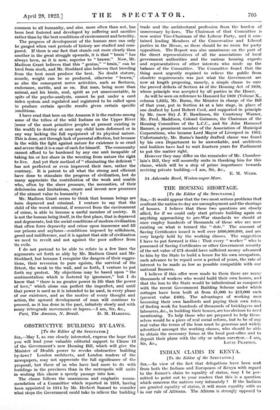OBSTRUCTIVE BUILDING BY-LAWS.
[To the Editor of the SPECTATOR.] SIR,—May I, as one closely interested, express the hope that you will lend your valuable editorial support to Clause 13 of the Government's new Housing Bill, which will give the Minister of Health power to revoke obstructive building by-laws ? London architects, and London readers of the newspapers, may not appreciate the full significance of the proposal, - but those of us who have had more to do with buildings in the provinces than in the metropolis will unite in wishing this clause a speedy passage into law.
The clause follows the unanimous and emphatic recom- mendation of a Committee which reported in 1918, having been appointed in 1914 by Mr. Herbert Samuel to consider what steps the Government could take to relieve the building trade and the architectural profession from the burden of unnecessary by-laws. The Chairman of that Committee is now senior Vice-Chairman of the Labour Party, and it con- tained leading Members of the Conservative and Liberal parties in the House, so there should be no room for party opposition. The Report was also unanimous on the part of the direct representatives of all the associations of local government authorities and the various housing experts and representatives of other interests who made up the balance of the Committee. The Committee found that the thing most urgently required to relieve the public from obsolete requirements was just what the Government are now at length proposing, namely, a simple clause to cure the proved defects of Section 44 of the Housing Act of 1909, whose principle was accepted by all parties in the House.
As will be seen on reference to Hansard for 1909 (Volume X., column 1,655), Mr. Burns, the Minister in charge of the Bill of that year, put in Section 44 at a late stage, in place of one drafted by Lord Robert Cecil, and supported in principle by Mr. (now Sir) J. F. Rawlinson, Sir Courtenay Warner, Mr. Fred. Maddison, Colonel Guinness, the Chairman of the Housing Committee of the L.C.C., and Sir John Harmood Banner, a prominent member of the Association of Municipal Corporations, who became Lord Mayor of Liverpool in 1912. Unfortunately, Mr. Burns's hastily drafted clause was found by his own Department to be unworkable, and architects and builders have had to wait fourteen years for Parliament to put the matter right.
However they may differ on the remainder of Mr. Chamber- lain's Bill, they will assuredly unite in thanking him for this clause, which will be a step of prime importance towards reviving private building.—I am, Sir, &c., E. M. WEBB.
54 Ashcombe Road, Weston-super-Mare.


















































 Previous page
Previous page